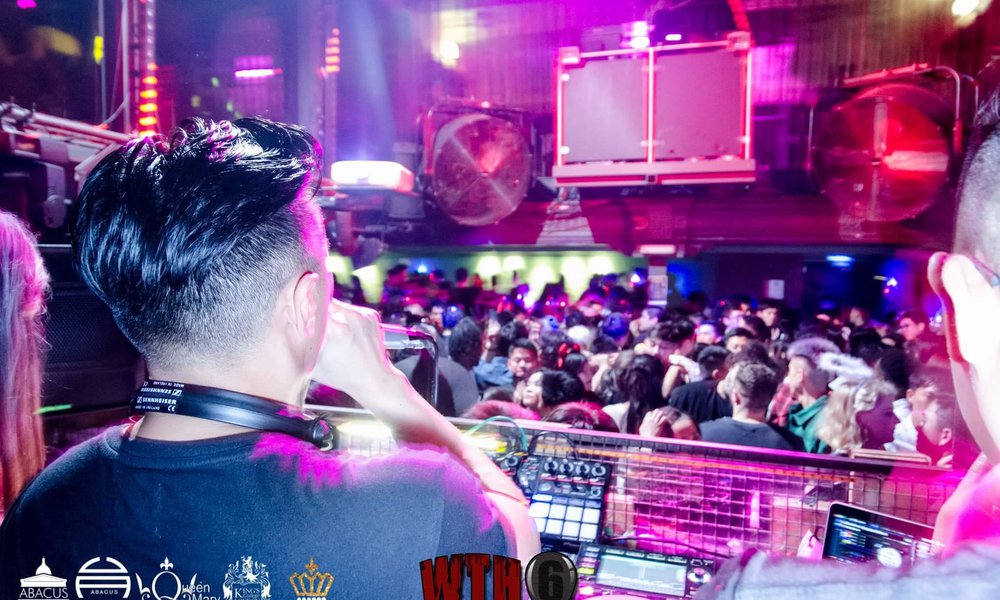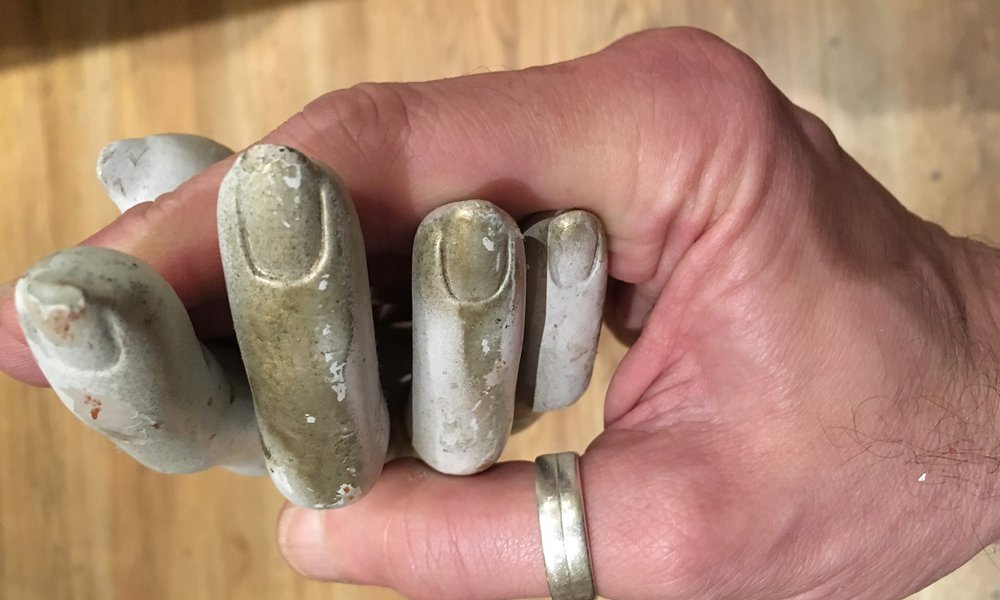Understanding the Niger Delta’s agaba masquerade tradition
by Dr David Pratten
21 Jun 2018
This blog is part of our Summer Showcase series, celebrating our free festival of ideas for curious minds.
My research is about the story of a masquerade called agaba. Masquerades are often seen as repositories of tradition. But this is a story of a thoroughly modern, militant mask – a story that encounters Nobel laureates, James Bond, the Oscars, Tupac and Delta warlords…
Sometimes agaba is known as mgbedike: time of the brave or strong. These names are in the Igbo language, and the mask originates from Igbo-speaking communities in the South-East of Nigeria.
In his trilogy of novels about the impact of colonialism on Igbo society, the Nobel laureate Chinua Achebe wrote about agaba, describing it as a huge, heavy mask that stood for the power and aggressiveness of youth. This gives us a clue to the ways in which the mask has always been closely associated with the identity, masculinity and quests for power and autonomy of young men.
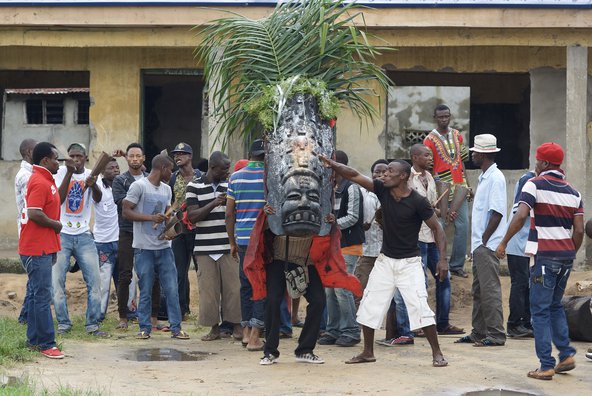
A history of masking
Perceptions of masquerades in Nigeria are ambivalent. On the one hand, they can be seen as something of the past, of traditional belief systems, and by Christians they can be seen as demonic. In colonial propaganda films, like the Oscar-winning Daybreak in Udi (1949), the forces of tradition, male gerontocracy and conservatism were represented by agaba masqueraders.
On the other hand, these masks often represent a culture’s heritage – they are celebrated at significant events such as festivals, burials, Christmas and New Year. It is as festivals, in fact, that the recent history of agaba starts. Igbo traders who moved to the coastal cities of Port Harcourt and Calabar for business in the 1940s and 50s performed their masked plays at school festivals, and on Igbo Day.
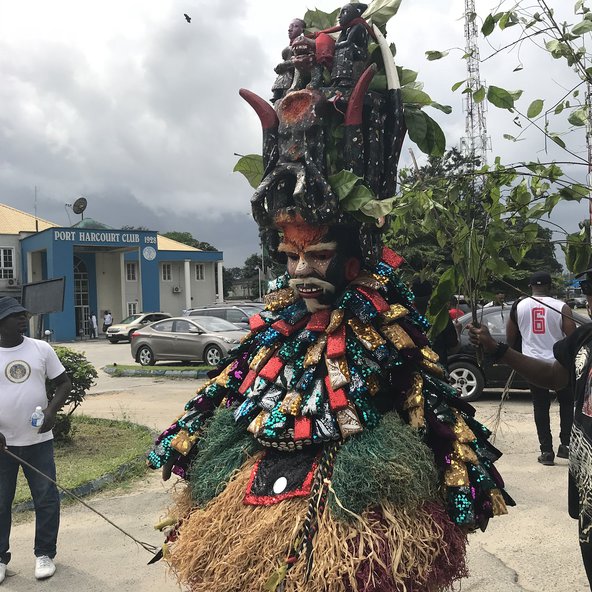
After the Nigerian Civil War (1967-70), with the Igbo traders leaving the cities, the agaba masquerade was taken over by local young men. In Calabar it was led by a group of Efik-speaking boxers and weightlifters from the poorer neighbourhoods of the south of the city. In Port Harcourt young men set up groups including 007 (in reference to the Bond movies). As it traced the violent contours of the Nigerian petro-state, the mask slipped from an ethnic designation to a generational one.
After the oil boom and during the recession years of the 1980s, youth unemployment in these cities was known as the ‘agaba syndrome’, and after clashes with the police there were attempts to ban the agaba masquerade. In recent years, the agaba groups have been associated with drugs and political violence. And while it distinguishes itself from violent gangs, agaba gives us an insight into the youth culture – the language, aesthetics, idioms of solidarity – common to a range of youth cults that have developed complex political links between the city streets and the Delta creeks.
During the insurgency across the Niger Delta in the mid-2000s young men joined militant groups in kidnapping, oil theft and sabotage in protest over the exploitation by the oil companies and the Nigerian state of the oil-producing communities. To give an indication of the link between the militants and the masquerade, patronage and performance, the former militant leader of the Niger Delta Vigilante, High Chief Ateke Tom, is now the ‘grand patron’ of the Area United agaba group in Port Harcourt.
Today agaba has spread right across the region’s rural and urban communities to become a mask of and for the youth. It is popular because it is constantly improvised and changing. Its vernacular is pidgin English – a kind of lingua franca. Aesthetically, the mask is grafted onto local traditions and styles, and physically the mask is a space to display skill, bravery and power.
The open-ended, improvised and subversive qualities of the mask are best demonstrated in its music. The music of the agaba masquerade is traditionally associated with the metal gong (ogele) and the wooden flute (oja). But the song repertoire recalls the ‘king’ of highlife, Port Harcourt’s own Cardinal Rex Lawson, as well as borrowing from prison songs, the palm wine drinking society, varsity cults, inverted hymns and the jarassis or slang of what is known as ‘gyration music’.
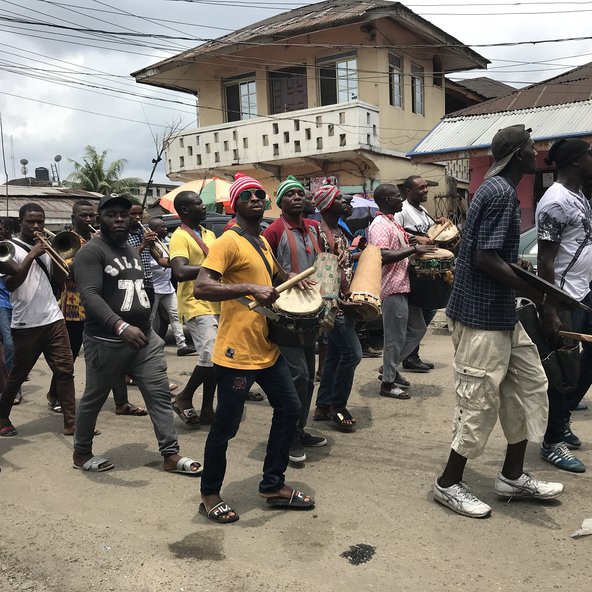
Agaba music and lyrics
Despite the vigorous, noisy and empowered context of the songs’ performance, the songs are rich in an irony that undercuts a stereotypical image of these young men’s societies as sinister and violent groups and reveal a surprising frankness about their precarious livelihoods and personal insecurities.
Most figurative among the agaba songs are those that deploy maritime and mafia imagery to describe the tough lives of young men living in the city. They liken this to the world of gangsta rappers when they sing about:
Dis rugged life
Where Tupac boys still de sail
It is a ‘worsky’ world (slang for its war-like arbitrariness) populated by ‘winchy’ people – a conflation of witches and wicked people usually referring to the police. Police corruption, typified by officers collecting roadside bribes, is ridiculed in another chorus:
Every junction police e-dey -
The political order is never far from the surface and folk heroes including the murdered rights activist Ken Saro Wiwa and journalist Dele Giwa feature in praise songs and laments:
See my people
See them suffer-eh
They suffer for work
Ogoni people say
Dey no go work for Shell oh
There is a duality of public calls to arms, and more private, laconic sketches of misfortune within the repertoire of agaba songs. They sing of the militant Egbesu cult in the Niger Delta:
Don’t you run, don’t you run away
If we jam Egbesu boys don’t you run away.
But at the same time, they lament love and loss in the city:
I want to marry one girl
Mi Mama no gree me oh
And dashed ambitions:
I want to be a pastor, I no get bible
I want to be a student, I no get biro
Like gang performance around the world, these songs open up social spaces 'where tenderness, humour, hope and solidarity intermingle with everyday tragedy'.
So why do young men – who in this Bible belt area might otherwise be in church, still perform these masquerades? Three reasons strike me as crucial. In the context of these young men’s ‘rugged lives’, agaba offers access to social networks for protection and profit in Nigeria’s patrimonial political economy. Second, through masquerade, youth are able to configure a masculine identity that’s tough, tested and both physically and spiritually ‘rugged’. Finally, agaba presents a powerful critique of the Nigerian social fabric. It is a space in which young men expose the inequalities and iniquities of their position from the margin, projecting advantage onto their own disadvantage.
David Pratten is Associate Professor in the Social Anthropology of Africa at the University of Oxford.

